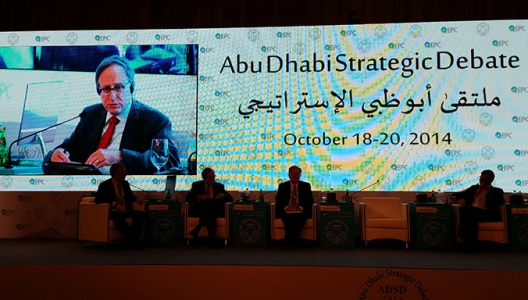 NATO is playing its part too. We all stand with our Ally Turkey, which is literally on the front line. And while the air campaign is not a NATO operation, NATO Allies provide the bulk of the military assets that are now being deployed to degrade ISIL. . . .
NATO is playing its part too. We all stand with our Ally Turkey, which is literally on the front line. And while the air campaign is not a NATO operation, NATO Allies provide the bulk of the military assets that are now being deployed to degrade ISIL. . . .
NATO has a solid record of cooperation with countries here in the Gulf. The launch of our Istanbul Cooperation Initiative ten years ago was a strong demonstration that the security and stability of this region is of strategic interest to NATO – just as the security and stability of the Euro-Atlantic area matter to the Gulf region.
The United Arab Emirates, Kuwait, Qatar and Bahrain have all made good use of the opportunities for dialogue and practical cooperation under the ICI. Saudi Arabia and Oman haven’t formally joined (although the door is open!), but we’re glad they have gradually stepped up their relations with NATO as well.
We’re also very pleased that our Gulf partners have proved increasingly effective security providers, including well beyond this region. They made valuable contributions to our mission in Afghanistan. They took an active part in our operation to protect the people of Libya three years ago. And they are again playing a major role in the international coalition to counter ISIL.
I believe it’s in our mutual interest to build on this progress and deepen our partnership, so we will be even better able to respond to future security challenges. I see particular potential in three areas:
First, NATO and its regional partners should intensify our political dialogue and practical cooperation. Bilateral contacts (28+1) will remain important. They are an opportunity for each of our individual Gulf partners to share their concerns, for NATO to tailor its assistance to those concerns, and for us all to develop a shared outlook on the key security challenges of this region.
I also see scope for closer multilateral relations between NATO and the Gulf Cooperation Council. We have already held exploratory talks. I believe we would all benefit from a more regular political dialogue, as well as a greater exchange of information between our organizations. That can run from strategy and doctrine to very practical issues about military planning. . . .
Second, we should work together to strengthen maritime security. Many European NATO Allies are highly dependent on energy from the Gulf region. And Gulf countries depend on the secure transport of their energy exports. So we have a clear, common interest in the safety of shipping lanes in this part of the world.
In recent years, Gulf countries have worked with NATO and other navies on several occasions. I would encourage them to step up that engagement by joining NATO’s counter-piracy operation in the western Indian Ocean – operation “Ocean Shield”. This would showcase their growing contribution to stability in the region and beyond. And it would help address a common threat to the security and well-being of all our nations.
Finally, we should further strengthen interoperability between our forces. During our Libya operation three years ago, this country and Qatar were able to contribute impressive air assets quickly and effectively. And in recent weeks, several of our Gulf partners have again demonstrated that ability to plug into a complex, multinational military operation very smoothly. . . .
To conclude, let me stress that, while many NATO members are deeply engaged in the region and in the fight against ISIL, NATO has no ambition to be the principal provider of security, either here in the Gulf or in the wider Middle East. But we do have a strategic interest in that security. And we have unique expertise and valuable assets that can help this country and our other Gulf partners here to bolster that security.
While we may always hope for the best, the rise of ISIL shows that we must all be prepared for the worst. We will always look for a diplomatic solution to any crisis. But we must all be able to back up diplomacy with effective military action. And we must be able to do so with the broadest possible regional and international support. That is what working with NATO can help our partners here in the Gulf to achieve.
Intervention by NATO Deputy Secretary General Alexander Vershbow at the Abu Dhabi Strategic Debate, October 19, 2014.
Image: NATO Deputy Secretary General Alexander Vershbow at the Abu Dhabi Strategic Debate (photo: NATO)
